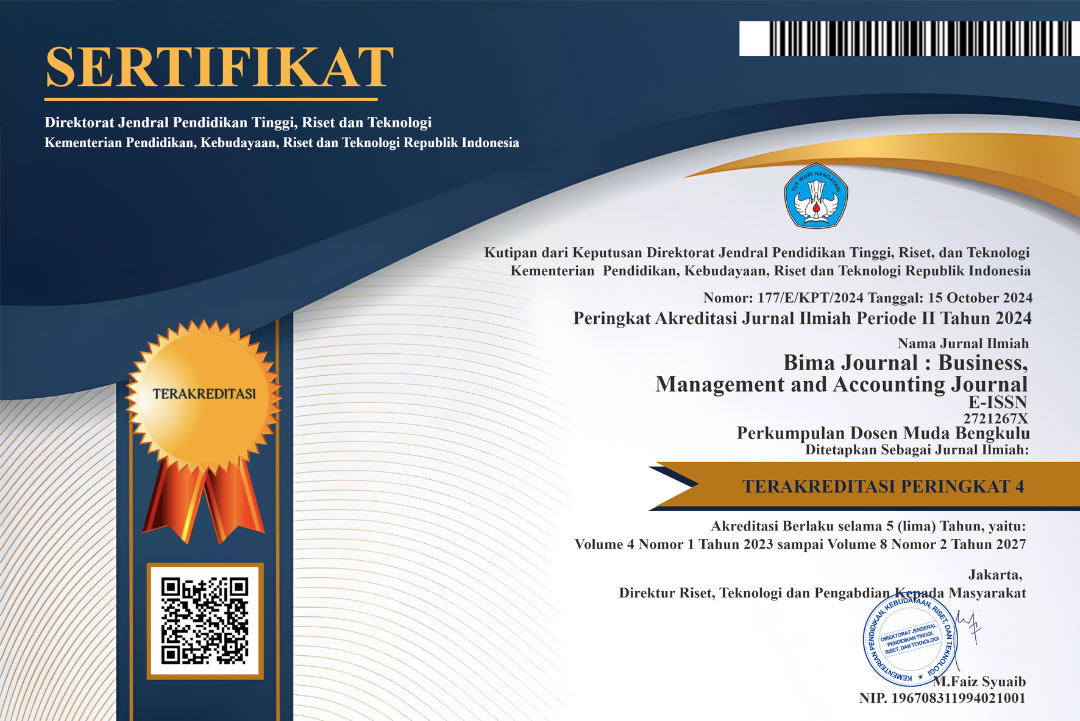Role Of Artificial Intelligence Adoption, Self Confidence, And Information Quality In Increasing E-Commerce Adoption And Marketing Performance Of Msmes In Palopo City
DOI:
https://doi.org/10.37638/bima.6.1.245-262Abstract
Purpose: This study aims to analyze how the adoption of Artificial Intelligence (AI), self-confidence, and information quality influence the adoption of e-commerce and the marketing performance of Micro, Small, and Medium Enterprises (MSMEs). Methodology: The research employed a survey method involving 222 MSME respondents in Palopo City. Data were analyzed using Structural Equation Modeling (SEM) with the Partial Least Squares (PLS) approach, which is appropriate for evaluating complex inter-variable relationships and hypothesis testing. Results: The findings demonstrate that AI adoption, self-confidence, and information quality each have significant effects on e-commerce adoption and, subsequently, on marketing performance. AI enables automation and personalization; self-confidence drives willingness to adopt innovation; and high-quality information supports better decision-making. Findings: The study reveals that these three variables act as enablers of digital transformation for MSMEs, particularly in strengthening their marketing competitiveness through e-commerce. Novelty: This research integrates psychological (self-confidence), technological (AI adoption), and informational dimensions into a single predictive model for MSME digital adoption. Originality: The study offers a comprehensive approach to understanding MSMEs' readiness for e-commerce in a developing region, a topic still underexplored in empirical literature. Conclusion: Adopting AI, fostering self-confidence, and ensuring quality information are key to enhancing e-commerce use and marketing outcomes in MSMEs. Type of Paper: Empirical research paper.
References
Adju, N. R. … Mendo, A. Y. (2022). Pengaruh Self Efficacy Dan Self Confidence Terhadap Kreativitas Pelaku Umkm Di Provinsi Gorontalo. Jambura, 5(2), 672–681. http://ejurnal.ung.ac.id/index.php/JIMB
Arroyabe, M. F. … Fernandez de Arroyabe, J. C. (2024). Analyzing AI adoption in European SMEs: A study of digital capabilities, innovation, and external environment. Technology in Society, 79(November 2023). https://doi.org/10.1016/j.techsoc.2024.102733
Ayob, A. H. (2021). E-commerce adoption in ASEAN: who and where? Future Business Journal, 7(1), 1–11. https://doi.org/10.1186/s43093-020-00051-8
Bang, H. K. … Traichal, P. A. (2000). Consumer concern, knowledge, belief, and attitude toward renewable energy: An application of the reasoned action theory. Psychology and Marketing, 17(6), 449–468. https://doi.org/10.1002/(SICI)1520-6793(200006)17:6<449::AID-MAR2>3.0.CO;2-8
Caputo, A., Nguyen, VHA, & Delladio, S. (2025). Pengambilan risiko, pengetahuan, dan pola pikir: mengungkap anteseden niat berwirausaha. Jurnal Kewirausahaan dan Manajemen Internasional , 21 (1). https://doi.org/10.1007/s11365-024-01064-3
Blanchard, O. … Uni-, C. (2020). Self-confidence and personal motivation* ´. August, 871–915.
Chen, D. … Wang, S. (2022). The Impact of Artificial Intelligence on Firm Performance: An Application of the Resource-Based View to e-Commerce Firms. Frontiers in Psychology, 13(April). https://doi.org/10.3389/fpsyg.2022.884830
Fisbein, M., & Ajzen, I. (1975). Belief, attitude, intention and behavior: An introduction to theory and research. In Massachusetts, Addison-Wiley Publishing Company.
Fonseka, K. … Raman, M. (2022). Impact of E-commerce adoption on business performance of SMEs in Sri Lanka; moderating role of artificial intelligence. International Journal of Social Economics, 49(10), 1518-1531Purpose: With the rapid development of te. https://doi.org/10.1108/IJSE-12-2021-0752
Gregory, G. D. … Karavdic, M. (2019). Developing e-commerce marketing capabilities and efficiencies for enhanced performance in business-to-business export ventures. Industrial Marketing Management, 78(March), 146–157. https://doi.org/10.1016/j.indmarman.2017.03.002
Henseler, J. … Sarstedt, M. (2015). A new criterion for assessing discriminant validity in variance-based structural equation modeling. Journal of the Academy of Marketing Science, 43(1), 115–135.
Hicham, N. … Karim, S. (2023). Strategic Framework for Leveraging Artificial Intelligence in Future Marketing Decision-Making. Journal of Intelligent Management Decision, 2(3), 139–150. https://doi.org/10.56578/jimd020304
Hollenbeck, G. P., & Hall, D. T. (2004). Self-confidence and leader performance. Organizational Dynamics, 33(3), 254–269. https://doi.org/10.1016/j.orgdyn.2004.06.003
Lala, V. … Guan, L. (2002). The impact of relative information quality of e-commerce assurance seals on internet purchasing behavior. International Journal of Accounting Information Systems, 3(4), 237–253. https://doi.org/10.1016/S1467-0895(02)00069-6
Markus, M. … Rosenblat, T. S. (2020). Managing self-confidence : Theory and experimental evidence Managing Self-Confidence : Theory and Experimental Evidence. 11.
Muawanah, W., & Trisnaningsih, S. (2022). Komparasi Kualitas Informasi Akuntansi dan Strategi Bertahan UMKM di Masa Pandemi. Al-Kharaj : Jurnal Ekonomi, Keuangan & Bisnis Syariah, 5(3), 1396–1404. https://doi.org/10.47467/alkharaj.v5i3.1776
Nurjaman, K. (2022). Pemberdayaan E-Commerce di Kalangan Pelaku UMKM di Indonesia. Jurnal Abdimas Peradaban, 3(1), 34–40. https://doi.org/10.54783/ap.v3i1.6
Octavia, A. … Asrini. (2020). Impact on e-commerce adoption on entrepreneurial orientation and market orientation in business performance of smes. Asian Economic and Financial Review, 10(5), 516–525. https://doi.org/10.18488/journal.aefr.2020.105.516.525
Rahmawati, S. … Setyowati, N. (2019). Faktor-Faktor yang Mempengaruhi Kinerja Pemasaran pada Usaha Mikro Kecil dan Menengah Pangan Olahan di Kota Surakarta. Jurnal Ekonomi Pertanian Dan Agribisnis, 3(2), 325–335. https://doi.org/10.21776/ub.jepa.2019.003.02.9
Latan, H., Chiappetta Jabbour, CJ, & Lopes de Sousa Jabbour, AB (2021). Media Sosial sebagai Bentuk Pengungkapan Pelanggaran Virtual: Bukti Empiris untuk Elemen-Elemen Model Berlian. Jurnal Etika Bisnis , 174 (3), 529–548. https://doi.org/10.1007/s10551-020-04598-y
Salah, O. H., & Ayyash, M. M. (2024). E-commerce adoption by SMEs and its effect on marketing performance: An extended of TOE framework with ai integration, innovation culture, and customer tech-savviness. Journal of Open Innovation: Technology, Market, and Complexity, 10(1), 100183. https://doi.org/10.1016/j.joitmc.2023.100183
Sindania, S., & Hartono, S. (2022). Peningkatan Kinerja Pemasaran Melalui Disruptive Innovation Yang Berbasis Intellectual Capital pada UMKM kabupaten Sukamara, Kalimantan Tengah. Jurnal Ekonomi Dan Bisnis, 21(2), 121. https://doi.org/10.30659/ekobis.21.2.121-134
Tragandi, R. … Mailindra, W. (2024). Pengaruh Celebrity Endorse dan Kualitas Informasi terhadap Keputusan Pembelian dengan Kepercayaan Sebagai Variabel Intervening pada Online Shop. Jurnal Ilmiah Universitas Batanghari Jambi, 24(2), 1916. https://doi.org/10.33087/jiubj.v24i2.5438
Jelahut FE, Utang HY, Jelahut YE, Jehamat L. MENALAR SKEPTIS ADOPSI ARTIFICIAL INTELIGENCE (AI) DI INDONESIA: ”˜Sebuah Tinjauan Filsafat Ilmu Komunikasi.’ J Filsafat Indones. 2021;4(2):172-178. doi:10.23887/jfi.v4i2.33794
Ambarwati T, Fitriasari F. Efikasi Diri Terhadap Kinerja Usaha Dengan Komitmen Berwirausaha Sebagai Variabel Mediasi Pada Umkm. J Ilmu Manaj. 2021;9(4):1430-1439. doi:10.26740/jim.v9n4.p1430-1439
Sulistiani H, Susanto ER, Puspaningrum AS, Marizki G, Neneng N. Analisis Pendukung Keputusan Memilih Cms E-Commerce Pada Umkm Orbs. J Inform dan Rekayasa Perangkat Lunak. 2022;3(3):347-353. doi:10.33365/jatika.v3i3.2312
Huang MH, Rust RT. A strategic framework for artificial intelligence in marketing. J Acad Mark Sci. 2021;49(1):30-50. doi:10.1007/s11747-020-00749-9
Li L, Wang Y, Zhang Y. Analysis on the Application of Artificial Intelligence in Cross-Border E-commerce. 2021;517(Sschd 2020):667-670. doi:10.2991/assehr.k.210121.133
Mohamed NN, Jaafar N, Ayupp K. The Influence of User-Generated Content Information Credibility and Information Adoption on Consumer Purchase Intention. Int J Acad Res Bus Soc Sci. 2023;13(2):475-488. doi:10.6007/ijarbss/v13-i2/16269
Octavia A, Indrawijaya S, Sriayudha Y, Heriberta, Hasbullah H, Asrini. Impact on e-commerce adoption on entrepreneurial orientation and market orientation in business performance of smes. Asian Econ Financ Rev. 2020;10(5):516-525. doi:10.18488/journal.aefr.2020.105.516.525
Rahayu R, Day J. E-commerce adoption by SMEs in developing countries: evidence from Indonesia. Eurasian Bus Rev. 2017;7(1):25-41. doi:10.1007/s40821-016-0044-6
Sun Q. Analysis of the Influence of E-commerce on the Innovative Development of Marketing. 2020;118(Msie 2019):113-115. doi:10.2991/msie-19.2020.24
Fisbein M, Ajzen I. Belief, Attitude, Intention and Behavior: An Introduction to Theory and Research.; 1975. MAR2>3.0.CO;2-8
Zhang B. Artificial Intelligence in Marketing. Trans Soc Sci Educ Humanit Res. 2024;9(3):181-187. doi:10.62051/s4y73e41
Luo N. Innovation of E-Commerce Development Model under the Background of Artificial Intelligence and Wireless Communication. Wirel Commun Mob Comput. 2022;2022. doi:10.1155/2022/8572911
Gregory GD, Ngo LV, Karavdic M. Developing e-commerce marketing capabilities and efficiencies for enhanced performance in business-to-business export ventures. Ind Mark Manag. 2019;78(March):146-157. doi:10.1016/j.indmarman.2017.03.002
Wang YM, Chiou CC, Wang WC, Chen CJ. Developing an Instrument for Assessing Self-Efficacy in Data Mining and Analysis. Front Psychol. 2021;11(January):1-11. doi:10.3389/fpsyg.2020.614460
Almtiri Z, Miah SJ, Noman N. Impact of Business Analytics and Decision Support Systems on E-commerce in SMEs. Lect Notes Comput Sci (including Subser Lect Notes Artif Intell Lect Notes Bioinformatics). 2023;13864 LNCS:344-361. doi:10.1007/978-981-99-2233-8_25
Liang X, Gao Y. Marketing performance measurement systems and firm performance: Are marketing capabilities the missing links? Eur J Mark. 2020;54(4):885-907. doi:10.1108/EJM-05-2018-0302
Basty R, Celik A, Said H. The Academic Discipline of Information Technology: A Systematic Literature Review. Issues Informing Sci Inf Technol. 2023;20:001-023. doi:10.28945/5130
Surjatmodjo D. Study of Management Information Systems on Employee Performance Through Interpersonal Communication at Regional State Intelligence Agency Offices South Sulawesi Province. Daengku J Humanit Soc Sci Innov. 2023;3(2):323-328. doi:10.35877/454ri.daengku1511
Ibrahim A, Napian SDR, Firanisa A, Sartika, Sari RD, Audya M. The Effect of E-Commerce Application Service Quality of Customer Loyalty Using Customer Relationship Management Approach. 2020;172(Siconian 2019):680-687. doi:10.2991/aisr.k.200424.103
Mintz O. Metrics for Marketing Decisions: Drivers and Implications for Performance. NIM Mark Intell Rev. 2023;15(1):18-23. doi:10.2478/nimmir-2023-0003
Mustari, Hamzah H. E-Business-Based Marketing Strategy in the Silk Fabric Industry of Non-Machine Weaving Equipment (ATBM) in Wajo Regency. Proc Int Conf Soc Econ Business, Educ (ICSEBE 2021). 2022;205(Icsebe 2021):184-188. doi:10.2991/aebmr.k.220107.035
Baruch Y, Holtom BC. Survey response rate levels and trends in organizational research. Hum Relations. 2008;61(8):1139-1160. doi:10.1177/0018726708094863
James K, Betty N, Thaddeo MJ, Kirabira JB. Blood production factors affecting transfusion sustainability: A study by using smart PLS-SEM approach. J Open Innov Technol Mark Complex. 2024;10(1):100247. doi:10.1016/j.joitmc.2024.100247
Hair JF, Ringle CM, Sarstedt M. PLS-SEM: Indeed a silver bullet. J Mark theory Pract. 2011;19(2):139-152.
Fornell C, Larcker, David F. Fornell, C., & Larcker, D. F. (1981). Evaluating Structural Equation Models with Unobservable Variables and Measurement Error. J Mark Res. 1981;18(1):39-50.
Maszudi E, Khaddapi M, Kusdarianto I, Hamid RS, Muhammad, Jusni. Management of economic and environmental sustainability in international political economy perspective. IOP Conf Ser Earth Environ Sci. 2020;575(1). doi:10.1088/1755-1315/575/1/012048.
Fonseka, K., Jaharadak, A. A., & Raman, M. (2022). Impact of E-commerce adoption on business performance of SMEs in Sri Lanka; moderating role of artificial intelligence. International Journal of Social Economics, 49(10), 1518-1531Purpose: With the rapid development of te. https://doi.org/10.1108/IJSE-12-2021-0752
Henseler, J., Ringle, C. M., & Sarstedt, M. (2015). A new criterion for assessing discriminant validity in variance-based structural equation modeling. Journal of the Academy of Marketing Science, 43(1), 115–135.
Yuen, T. M. (2023). Going Digital for SMES: Adapting Business Model and Seizing Opportunities to Achieve Sustainable Business Performance. International Journal of Academic Research in Business and Social Sciences, 13(2), 437–449. https://doi.org/10.6007/ijarbss/v13-i2/16370
Downloads
Additional Files
Published
Issue
Section
License
An author who publishes in the BIMA JOURNAL: Business, Management, and Accounting Journal agrees to the following terms:
Author retains the copyright and grants the journal the right of first publication of the work simultaneously licensed under the Creative Commons Attribution-ShareAlike 4.0 License that allows others to share the work with an acknowledgement of the work's authorship and initial publication in this journal
Submission of a manuscript implies that the submitted work has not been published before (except as part of a thesis or report, or abstract); that it is not under consideration for publication elsewhere; that its publication has been approved by all co-authors. If and when the manuscript is accepted for publication, the author(s) still hold the copyright and retain publishing rights without restrictions. For the new invention, authors are suggested to manage its patent before published. The license type is CC-BY-SA 4.0.
BIMA JOURNAL: Business, Management and Accounting is licensed under a Creative Commons Attribution-ShareAlike 4.0 International License.
You are free to:
Share — copy and redistribute the material in any medium or format
Adapt — remix, transform, and build upon the material
for any purpose, even commercially.
The licensor cannot revoke these freedoms as long as you follow the license terms.
Under the following terms:
Attribution — You must give appropriate credit, provide a link to the license, and indicate if changes were made. You may do so in any reasonable manner, but not in any way that suggests the licensor endorses you or your use.
ShareAlike — If you remix, transform, or build upon the material, you must distribute your contributions under the same license as the original.
- No additional restrictions — You may not apply legal terms or technological measures that legally restrict others from doing anything the license permits.
Notices:
- You do not have to comply with the license for elements of the material in the public domain or where your use is permitted by an applicable exception or limitation.
- No warranties are given. The license may not give you all of the permissions necessary for your intended use. For example, other rights such as publicity, privacy, or moral rights may limit how you use the material.





















